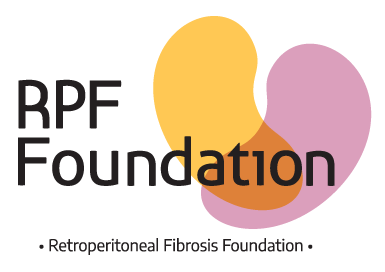

Retroperitoneal Fibrosis

Retroperitoneal Fibrosis
Treatments
Medical Team
Medical Team
Patients with retroperitoneal fibrosis can often experience challenges in finding providers to help diagnose and manage this condition. This is because retroperitoneal fibrosis is a relatively uncommon / rare condition and not all providers are aware of this disease and how to diagnose or manage it.
Which providers are comfortable managing your RPF may depend on your institution? The most important thing is to find an institution that has familiarity with RPF and providers with experience correctly diagnosing and managing it. If your local institution does not have experience, then considering a referral an institution with expertise is key.
Your care team may include some of the following specialties.
Nephrologist
RPF is not a disease of the kidney itself but since the kidney can be involved and impaired because of obstruction of the urine getting out, a nephrologist (kidney doctor) may be involved to assist in monitoring of renal function.
Urologist
For patients with obstruction of the ureters, a urologist can assist by placing ureteral stents to help the urine get out. In patients where surgery might be needed to move the ureters, a urologist with expertise in ureteral reconstruction is needed.
Rheumatologist
Because some of the causes of RPF are due to an over active immune system, rheumatologists may be involved in order to use medications to reduce the inflammation and over-activity of the immune system with prednisone and immunosuppressive medications.
Interventional Radiologist
These are providers that can use advanced imaging techniques to perform procedures. For patients with RPF, interventional radiologists may be needed to obtain biopsies of the soft tissue mass, place nephrostomy tubes into the kidney through the back, or place stents in the veins (inferior vena cava or iliac veins) if there is significant narrowing causing leg swelling.
Hematologist/Oncologist
If the retroperitoneal fibrosis is due to a secondary cause like lymphoma, solid organ cancer (breast, pancreas, etc), or Erdheim-Chester disease, a hematologist/oncologist would assist with treating the secondary cause.
Common Treatments
Common Treatments
Ureteral Stent:
For patients with back up of the urine, a ureteral stent might be placed from the bladder to one or both kidneys, depending on which sides are involved. This can be done through one of two approaches.
1) Cystoscopy: This is where a thin flexible tueb with a camera is inserted through the urethra (the opening where the urine comes out) into the bladder. The tube is used to guide a wire from the bladder to the kidney(s) and then place a stent (plastic tube) that helps the ureter stay open and allow the urine to makes its way from the kidney to the bladder.
2) Percutaneous: This is where a needle is placed through your back into the kidney and then a stent is placed over the guidewire – from the kidney down to the bladder.
Nephrostomy Tube
This procedure is where a needle is placed through the back into the kidney. A thin plastic tube is guided over the needle into the kidney. A bag is placed to the end of the plastic tube to allow the urine to drain out from the kidney into a collection bag that can be emptied.
Medical Treatments
Medical Treatments
For Secondary RPF – the treatment will be dependent on the secondary cause. For example, if the cause is due to lymphoma, then treatment directed to the lymphoma are needed.
For Primary RPF – treatment typically will involve prednisone (steroids) and immunosuppression. Prednisone (steroids) are often used initially to try to reduce the inflammation of the soft tissue mass. Doses may initially be between 30-60 mg/day and taper over several weeks/months.
For patients with Idiopathic RPF treatments may also include one of the following medications:
• Mycophenolate mofetil (Cellcept) – oral pills
• Azathioprine (Imuran)- oral pills
• Methotrexate (Trexall) – oral pills
• Tocilizumab (Actemra) – subcutaneous injections or intravenous infusion
For patients with RPF associated with IgG4-related disease – treatment may include medications like rituximab (Rituxan) or inebilizumab (Uplizna)
Azathioprine
Methotrexate
Mycophenolate Mofetil
Rituximab
Tocilizumba
Uplizna
Surgical Interventions
Surgical Interventions
For patients where medical therapy is not able to shrink the soft tissue mass to allow removal of the ureteral stents or nephrostomy tubes, a surgery to move the ureters away from the soft tissue might be an option.
This surgery is called a URETEROLYSIS. During this surgery, the urologist will move the ureter away from the fibrotic mass in order to protect it from obstruction. The intent of this surgery is to allow removal of the stent or nephrostomy tubes.
It is generally considered best for medical therapy to be tried first before surgery.




